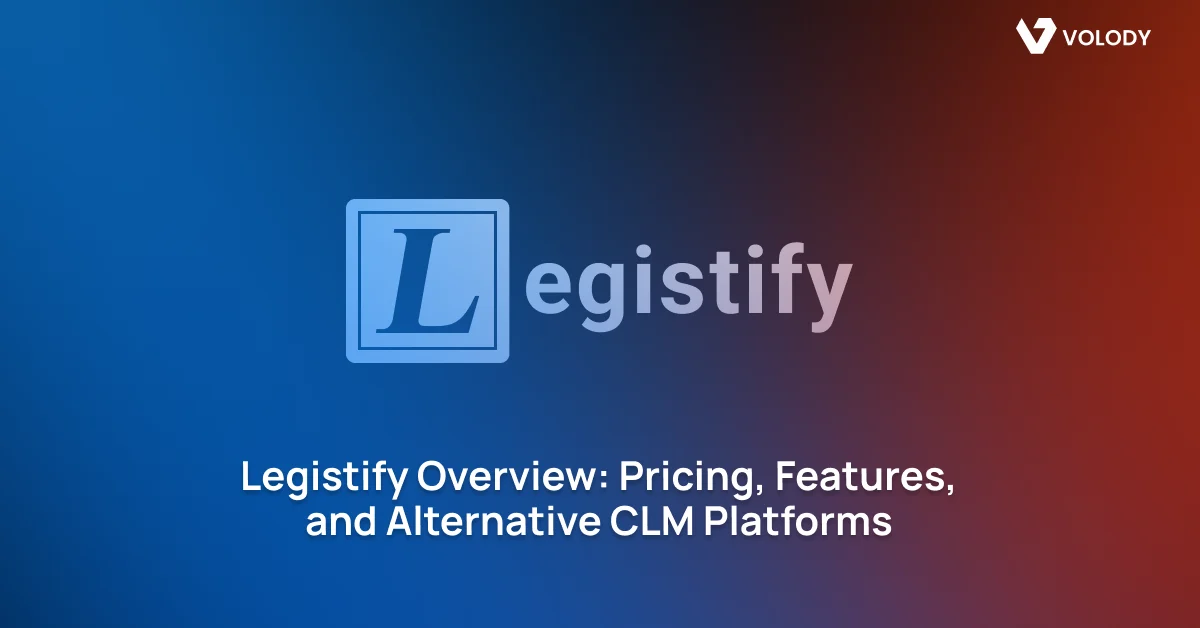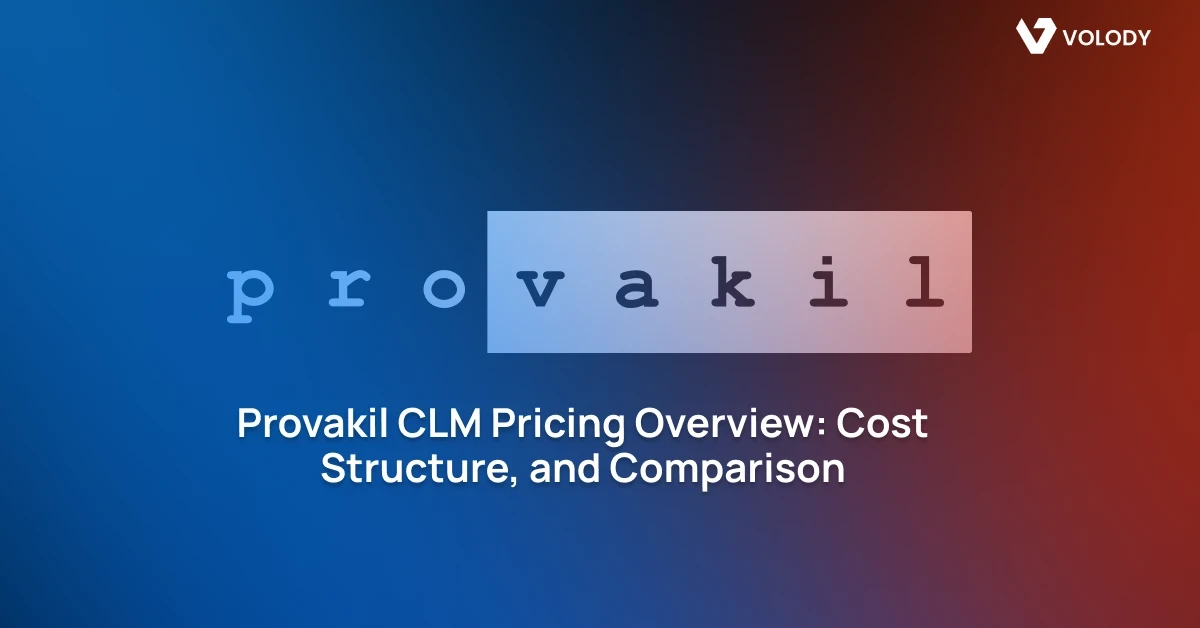Vansh Bhatnagar
Sep 24, 2025

E-commerce thrives on innovation and global reach. However, its rapid evolution introduces a labyrinth of legal challenges. Businesses face constant pressure to comply with local consumer laws and international data privacy regulations. Navigating this landscape without robust tools can significantly hinder growth. It also invites substantial legal and financial risks.
This comprehensive guide explores the full spectrum of legal complexities in e-commerce. We delve into often-overlooked areas like web accessibility and advanced Terms of Service enforcement. Emerging ESG regulations also receive crucial attention. We demonstrate how advanced Contract Lifecycle Management (CLM) software provides proactive, technology-driven solutions. This empowers legal professionals and decision-makers for sustainable global growth.
What Are the Foundational Legal Challenges in Today's E-commerce?
Today's e-commerce environment presents unique legal challenges. Businesses must navigate a complex web of regulations to succeed. Many foundational legal aspects are often overlooked or oversimplified by competitors. This oversight often causes major compliance failures, harming reputations and profits. Establishing a strong legal baseline is therefore vital for building early consumer trust.
Every online business must pay careful attention to key foundational legal areas for e-commerce. These include:
Consumer Protection Laws: These laws safeguard buyers. They protect customers against deceptive practices and ensure product safety in online transactions.
Intellectual Property (IP): This involves protecting your brand's trademarks. It also means respecting content copyrights for all digital assets.
Advertising Compliance: This means following "truth in advertising" principles. It also requires transparent endorsement disclosures for all marketing.
Data Privacy Principles: These principles ensure transparent data collection. They also safeguard consumer information across all platforms. Understanding these core areas is vital. It helps businesses avoid common pitfalls.
These elements form the foundation for all e-commerce legal complexities. Many businesses, especially startups, face initial compliance gaps. Industry data suggests overlooking basic legal requirements often causes problems. Without a strong strategy, the risk of legal disputes and financial penalties rises significantly. Prioritizing these foundational issues builds immediate trust and strengthens market position.
Relying on generic legal advice exposes your business to unnecessary risks. A tailored approach, supported by proactive management, is essential for sustainable growth. E-commerce contract automation streamlines compliance checks effectively. Implementing legal compliance software further improves operations and reduces legal risks. This proactive stance simplifies legal operations and supports long-term success.
How Can E-commerce Businesses Master Cross-Border Compliance?
Running an e-commerce business worldwide brings unique challenges. Many competitors often miss important cross-jurisdictional complexities. Handling these e-commerce legal issues carefully is crucial. Failing to follow global regulations can lead to large financial penalties. Understanding and obeying these rules protects your brand and helps your business grow.
First, understanding different sales tax systems, or "tax regimes," is essential. Europe uses Value Added Tax (VAT), a consumption tax, while many other countries use Goods and Services Tax (GST). In the United States, "remote seller nexus" rules define state sales tax obligations. Tax duties vary by region and product. Correctly calculating these taxes is a fundamental part of compliance.
Beyond taxes, businesses must also consider regional licensing. Some US states require specific permits for sellers, and the EU may demand certain business registrations. Global import and export laws create another detailed set of rules. These include payments like customs duties and tariffs. They also cover product classification for shipping.
Several critical areas require attention for global compliance:
Denied Party Screening: You must check customers and business partners. Make sure they are not on government-restricted lists.
Embargoes: You must follow trade bans with specific countries.
Product Safety Standards: Your products must meet various local safety regulations.
Data Privacy Laws: You must obey worldwide data privacy rules. Examples include GDPR (General Data Protection Regulation) and CCPA (California Consumer Privacy Act).
Ignoring specific country laws creates major risks. Breaking these rules often leads to large fines and lawsuits. Many businesses run into problems because they lack a strong global legal view. This shows a clear need to actively manage e-commerce legal risks. Therefore, planning ahead is vital for lasting success.
Fortunately, modern tools simplify global compliance. E-commerce legal compliance software tracks changing regulations effectively. Automated contract workflows for e-commerce speed up necessary paperwork. Digital contract management for online businesses helps handle agreements well. This combined approach makes legal operations easier and promotes safe global trade.
What Platform-Specific Legalities Build User Trust and Mitigate Risk?
Legal compliance is essential for e-commerce success. It builds user trust and avoids major legal problems. Proactively following regulations protects your business from potential liabilities. This approach also strengthens your market position. Let's explore key legal areas beyond contract management.
Web Accessibility Compliance
Website accessibility is a basic legal requirement today. The Americans with Disabilities Act (ADA) sets national standards for equal web access. Web Content Accessibility Guidelines (WCAG 2.1+) provide specific technical rules for website usability. Meeting these guidelines prevents expensive lawsuits and expands your customer base. E-commerce compliance software assists in managing these crucial accessibility standards.
Payment Processing Security
Secure payment processing is absolutely essential for online businesses. The Payment Card Industry Data Security Standard (PCI DSS) sets global rules to protect payment information. Adhering to these standards safeguards sensitive customer data from breaches. It also prevents expensive fraud and avoids significant financial penalties. Implementing strong encryption and regular security audits are vital to minimize e-commerce risks.
You might want to check: AI-Powered CLM Software for Retail & Consumer Goods Industry
Robust Terms of Service (ToS)
Your Website Terms of Service (ToS) is a vital legal agreement. These terms clearly state both user responsibilities and platform duties. You must write clear and complete ToS for enforceability. Ensure users provide legally binding acceptance through clear mechanisms like:
Clickwrap: Users must actively agree. Clickwrap makes the agreement highly enforceable.
Browsewrap: This offers less legal protection.
Here, consent is simply implied when someone uses your website. Digital contract management helps online businesses simplify this process. It ensures proper record-keeping for audit trails. This proactive approach strengthens legal defensibility. It also builds user confidence in your platform.
Third-Party Marketplace Liabilities
Selling products on platforms like Amazon or Etsy brings specific legal challenges. Understand intellectual property (IP) rights protection. IP covers creations like inventions or designs. Carefully review data sharing agreements and indemnification clauses with the platform. These clauses shift responsibility for damages, shielding your business and streamlining e-commerce legal operations.
How Are Emerging ESG Regulations Reshaping E-commerce Compliance?
Legal issues in e-commerce are changing quickly. Emerging Environmental, Social, and Governance (ESG) regulations now greatly affect online businesses. ESG refers to standards investors use for screening company operations. These rules are moving from optional guidelines to required reporting. E-commerce platforms must adopt a proactive approach, ensuring strong oversight.
These new rules address many parts of how businesses operate. Supply chain transparency is now essential for all retailers, requiring ethical sourcing records. Companies must ensure fair labor practices and environmentally protective production methods. Ignoring these areas risks major brand and financial harm. It also significantly erodes consumer trust.
Several key areas for e-commerce compliance fall under ESG guidelines. Businesses must proactively address these to build trust and avoid penalties. This impacts everything from marketing claims to financial disclosures. Adhering to these standards is no longer optional.
Sustainability Claims: Companies must back environmental claims with provable data. False or misleading claims, known as greenwashing, now bring serious legal punishments.
Consumer Trust: Build confidence through clear product information and ethical business practices. Consumers increasingly prefer to buy from responsible brands.
Mandatory Reporting: Rules like the EU Corporate Sustainability Reporting Directive (CSRD) require detailed ESG information. The CSRD, a EU law, affects many global e-commerce companies with EU operations or supply chains.
ESG does more than just ensure compliance; it also heavily affects a brand's reputation and how loyal its customers are. As one top e-commerce founder states, "Following ESG guidelines is not just an option anymore; it is crucial." They add, "It directly impacts our position in the market and how attractive we are to investors." Investors now look very closely at ESG performance when they consider new investments. Strong ESG strategies draw in ethical consumers and build value for the long term.
Managing these complex, changing requirements efficiently is extremely important. Digital contract management for online businesses is a key tool. Legal compliance software for e-commerce helps companies track duties effectively. Automated contract workflows greatly aid e-commerce legal risk mitigation, reducing overall risks. This approach ultimately streamlines e-commerce legal operations across the company, making processes more efficient.
Related Article: Digitally empowering commerce: E-contracts
How Does Advanced CLM Transform E-commerce Legal Compliance?
Advanced Contract Lifecycle Management, or CLM, truly changes e-commerce legal compliance. It moves past simply storing contracts. CLM offers a complete solution for complex e-commerce legal challenges. It centralizes all agreements and regulatory documents, providing practical solutions. This empowers legal and operational teams, reshaping legal operations for online businesses.
CLM greatly simplifies contract management. It enables efficient, automated workflows for e-commerce companies. CLM speeds up contract creation, negotiation, and approval processes. Strong audit trails and version control help resolve disputes effectively. It also aids proactive risk management with automated alerts for key dates and compliance deadlines.
Ensuring global data privacy compliance is a major e-commerce challenge. Advanced CLM effectively manages Data Processing Agreements (DPAs), which are legal data handling contracts. CLM handles consent forms and tracks data flows across many regions. This is vital for following rules like GDPR and CCPA. It integrates smoothly with existing platforms, boosting operational efficiency, making CLM essential legal compliance software.
Automating processes with CLM reduces significant e-commerce legal risks. It simplifies complex legal tasks. CLM goes beyond basic "clickwrap" management for online agreements. Case studies show advanced digital contract management leads to higher compliance. This comprehensive approach gives businesses confidence to navigate legal rules, ensuring ongoing fairness and operational efficiency.
Frequently Asked Questions
Q: How do e-commerce sales tax rules differ between the US, EU, and Asia-Pacific regions?
A: In the EU, e-commerce sales are subject to Value Added Tax (VAT), a consumption tax. Many other countries, often including those in the Asia-Pacific region, utilize a Goods and Services Tax (GST). In contrast, the United States employs "remote seller nexus" rules. These rules determine a business's obligation to collect state-specific sales taxes.
Q: Are there distinct consumer protection laws for e-commerce in countries like Canada, Australia, or Brazil?
A: The provided blog content does not explicitly address distinct consumer protection laws for e-commerce in specific countries. While it broadly discusses the importance of consumer protection laws, it does not detail specific regulations within nations such as Canada, Australia, or Brazil. It focuses on general cross-border compliance complexities.
Q: How can businesses ensure compliance with varying electronic signature laws across different countries?
A: Canada, Australia, and Brazil each regulate e-commerce under consumer protection laws. Canada uses provincial laws and PIPEDA for disclosures, refunds, and privacy. Australia’s ACL guarantees refunds, bans misleading conduct, and regulates subscriptions. Brazil’s Consumer Code and Decree 7,962/2013 mandate clear online disclosures and grant a 7-day cooling-off right.
Q: What are the key legal considerations for intellectual property protection when selling internationally?
A: For intellectual property protection, key considerations include safeguarding your brand's trademarks. It also involves respecting content copyrights for all digital assets. Furthermore, understanding IP rights for creations like inventions or designs is crucial. While the blog emphasizes IP as a foundational legal challenge, it does not explicitly detail specific international legal considerations for IP protection when selling globally.
About the Company

Volody AI CLM is an Agentic AI-powered Contract Lifecycle Management platform designed to eliminate manual contracting tasks, automate complex workflows, and deliver actionable insights. As a one-stop shop for all contract activities, it covers drafting, collaboration, negotiation, approvals, e-signature, compliance tracking, and renewals. Built with enterprise-grade security and no-code configuration, it meets the needs of the most complex global organizations. Volody AI CLM also includes AI-driven contract review and risk analysis, helping teams detect issues early and optimize terms. Trusted by Fortune 500 companies, high-growth startups, and government entities, it transforms contracts into strategic, data-driven business assets.






